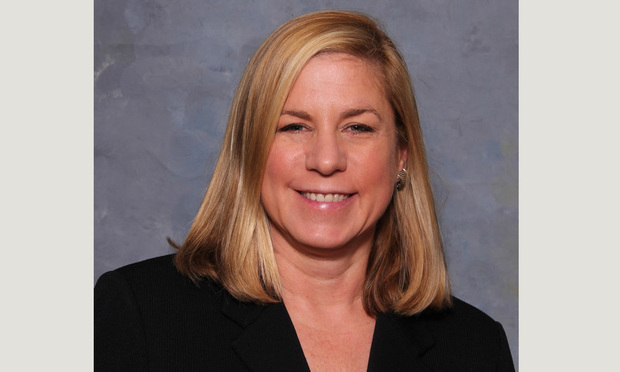Take the Lead: Workplace Issues Affecting You Now
One attorney who suffers from addiction affects many lives exponentially. Addiction is not just one person or one attorney, it affects the entire law firm community in one way or another.
January 28, 2020 at 12:18 PM
6 minute read
 Lauri Kavulich of Clark Hill.
Lauri Kavulich of Clark Hill.It is the 100th anniversary of prohibition (Jan. 17, 1920), and the end of Dry January, a month where resolution keepers strive to abstain from alcohol for the first month of the year. Given the season, this month's column is devoted to the not-so-secret secret of lawyers and problematic drinking and substance abuse. I have experienced the issues surrounding addiction in my professional career both as a practitioner advising clients and as a law firm partner and leader. One attorney who suffers from addiction affects many lives exponentially. Addiction is not just one person or one attorney, it affects the entire law firm community in one way or another. It is an issue that must be addressed head on by leadership if we are to protect and assist our employees, our firm and our clients. As I stated in my last column, law firms consist of human capital. Human capital brings with it all of the issues humans face, including mental illness, addiction and substance abuse.
The ABA Commission on Lawyer Assistance Programs, in collaboration with the Hazelden Betty Ford Foundation, sought to update our understanding of substance abuse and mental health in the legal profession in 2016 (Journal of Addiction Medicine, February 2016). The study paints a story of a profession rife with substance abuse, anxiety and depression. Researchers found that 20.6% of respondents engaged in hazardous drinking, with higher rates experienced by attorneys in private practice and less-experienced attorneys. Attorney illicit substance use of intermediate concern or higher represents 24% of the attorneys surveyed.
Mental health closely links to substance abuse, and also disproportionately affects the legal community (28% have experienced depression, 19% anxiety, 23% stress and suicidal ideation affects 11.5% of the population, according to the study). Due to the space limitations of the column, I am going to focus on substance abuse because mental health and how to support mental health deserves its own column, stay tuned.
There was a big splash when the ABA/Hazelden Betty Ford study came out, but the results need to be repeated over and over again. Think about those statistics. Are we as leaders in the legal profession doing enough about it?
The answer is support, education and destigmatization. Advising employees that there is an EAP program available in the employee benefits package isn't enough. Calling it a "problem" doesn't help. Ignoring it won't make it go away. Since a significant portion of our legal population is suffering, including within your own firm (one out of five offices is occupied by an attorney who engages in hazardous drinking) it is time to act in real, meaningful ways.
The study reveals that to start, lets focus on younger associates. Of those drinking hazardously, 43.7% reported their problematic use started within the first 15 years of their legal career. Young attorneys under 30 years old have a pronounced 35% risk of hazardous drinking.
Education can be an important preventative measure. Many might meet the threshold of problematic drinking without realizing it—allowing hazardous behavior to metastasize into a more significant problem by the time detection occurs. I recommend that your firm offer education modules in your training resources to help associates—particularly juniors—identify the early stages of hazardous drinking and make it part of your training curriculum. Training associates to spot substance abuse in others can also aid in prevention by giving associates the knowledge and skills to reach out to their peers when concerned. Also, create an open dialogue about the pressures of the profession and the results of the ABA study in order that associates understand the risks of alcohol and substance abuse within the profession. There are many resources through the Pennsylvania Bar Association Lawyers Concerned for Lawyers, the ABA, and websites of organizations such as the Hazelden Betty Ford Clinic. Spend some time during orientation discussing it, bring in a professional to present the information and to offer assistance. At the very least, leadership can make efforts to ensure the information about addiction and substance abuse is presented and local resources are known to associates.
Culture can also play a role in the success of a young attorney. Although confrontation and competition cannot be excised from the practice of law, organizational culture can provide young associates with the structure to avoid hazardous behavior. A climate that fosters collaboration and support in the practice of law could also offer collaboration and support in in wellness. As the ABA notes, by the time attorneys seek the help of anonymous peer support groups the problem has usually escalated to a serious level. Creating and fostering internal support can help attorneys recognize and manage the issue sooner and prevent escalation.
A culture that allows attorneys to ask for help without stigma can prevent the worsening of an ongoing issue. What does this look like? Leaders who have gone through such issues opening up about their stories and letting the attorneys know that others have gone through it, it is not something to be ashamed of, and stressing that there is support within the firm structure. Identify peers within the firm who an attorney can confide in and ask for help. A designated peer can be educated and armed with information and resources available to assist if they are asked for help.
Wellness programs within the firm such as meditation, either guided or individual, are not just for new age hippies. Studies have shown that meditation only 10 minutes a day can significantly lower stress, and therefore lower the need for coping mechanisms such as turning to alcohol or other substances. That's only .2 billable hours. In 2020, the Clark Hill Philadelphia office will be offering meditation courses to our employees to give them the foundation for a meditation practice. It is another tool to promote and support well-being within the office.
This profession burdens many of its practitioners with competition, expectations and long hours. With the youngest attorneys at the greatest risk of substance abuse, those in leadership roles have the ability to act. We all have the obligation to address the issue within our community given that such a large part of our community is suffering. Reach out to a colleague to check in, remind your peers of the resources available inside and outside the organization, work to destigmatize the burdens faced by other attorneys, and revisit firm policies. These small actions might not change the abysmal statistics faced by attorneys overnight, but they can lead to the type of culture that allows attorneys to understand and manage substance abuse. Enjoy the rest of Dry January.
Lauri Kavulich, member-in-charge of Clark Hill's Philadelphia office, reports on the most prevalent issues affecting in-house counsel today. She focuses her practice on employment law and represents both public and private employers, including railroads.
This content has been archived. It is available through our partners, LexisNexis® and Bloomberg Law.
To view this content, please continue to their sites.
Not a Lexis Subscriber?
Subscribe Now
Not a Bloomberg Law Subscriber?
Subscribe Now
NOT FOR REPRINT
© 2025 ALM Global, LLC, All Rights Reserved. Request academic re-use from www.copyright.com. All other uses, submit a request to [email protected]. For more information visit Asset & Logo Licensing.
You Might Like
View All
Law Firms Look to Gen Z for AI Skills, as 'Data Becomes the Oil of Legal'

De-Mystifying the Ethics of the Attorney Transition Process, Part 2
Law Firms Mentioned
Trending Stories
- 1Trump's Inspectors General Purge Could Make Policy Changes Easier, Observers Say
- 2Supporting Our Supreme Court Justices in the Guardianship Part
- 3'Erroneous Rulings'?: Wilmer Asks 4th Circuit to Overturn Mosby's Criminal Convictions
- 4Judge Orders Acquittal of Ex-Prosecutor on 1 of 2 Counts in Misconduct Trial Over Ahmaud Arbery Case
- 5American Bar Association Calls for Enforceable Supreme Court Ethics Code
Who Got The Work
J. Brugh Lower of Gibbons has entered an appearance for industrial equipment supplier Devco Corporation in a pending trademark infringement lawsuit. The suit, accusing the defendant of selling knock-off Graco products, was filed Dec. 18 in New Jersey District Court by Rivkin Radler on behalf of Graco Inc. and Graco Minnesota. The case, assigned to U.S. District Judge Zahid N. Quraishi, is 3:24-cv-11294, Graco Inc. et al v. Devco Corporation.
Who Got The Work
Rebecca Maller-Stein and Kent A. Yalowitz of Arnold & Porter Kaye Scholer have entered their appearances for Hanaco Venture Capital and its executives, Lior Prosor and David Frankel, in a pending securities lawsuit. The action, filed on Dec. 24 in New York Southern District Court by Zell, Aron & Co. on behalf of Goldeneye Advisors, accuses the defendants of negligently and fraudulently managing the plaintiff's $1 million investment. The case, assigned to U.S. District Judge Vernon S. Broderick, is 1:24-cv-09918, Goldeneye Advisors, LLC v. Hanaco Venture Capital, Ltd. et al.
Who Got The Work
Attorneys from A&O Shearman has stepped in as defense counsel for Toronto-Dominion Bank and other defendants in a pending securities class action. The suit, filed Dec. 11 in New York Southern District Court by Bleichmar Fonti & Auld, accuses the defendants of concealing the bank's 'pervasive' deficiencies in regards to its compliance with the Bank Secrecy Act and the quality of its anti-money laundering controls. The case, assigned to U.S. District Judge Arun Subramanian, is 1:24-cv-09445, Gonzalez v. The Toronto-Dominion Bank et al.
Who Got The Work
Crown Castle International, a Pennsylvania company providing shared communications infrastructure, has turned to Luke D. Wolf of Gordon Rees Scully Mansukhani to fend off a pending breach-of-contract lawsuit. The court action, filed Nov. 25 in Michigan Eastern District Court by Hooper Hathaway PC on behalf of The Town Residences LLC, accuses Crown Castle of failing to transfer approximately $30,000 in utility payments from T-Mobile in breach of a roof-top lease and assignment agreement. The case, assigned to U.S. District Judge Susan K. Declercq, is 2:24-cv-13131, The Town Residences LLC v. T-Mobile US, Inc. et al.
Who Got The Work
Wilfred P. Coronato and Daniel M. Schwartz of McCarter & English have stepped in as defense counsel to Electrolux Home Products Inc. in a pending product liability lawsuit. The court action, filed Nov. 26 in New York Eastern District Court by Poulos Lopiccolo PC and Nagel Rice LLP on behalf of David Stern, alleges that the defendant's refrigerators’ drawers and shelving repeatedly break and fall apart within months after purchase. The case, assigned to U.S. District Judge Joan M. Azrack, is 2:24-cv-08204, Stern v. Electrolux Home Products, Inc.
Featured Firms
Law Offices of Gary Martin Hays & Associates, P.C.
(470) 294-1674
Law Offices of Mark E. Salomone
(857) 444-6468
Smith & Hassler
(713) 739-1250







